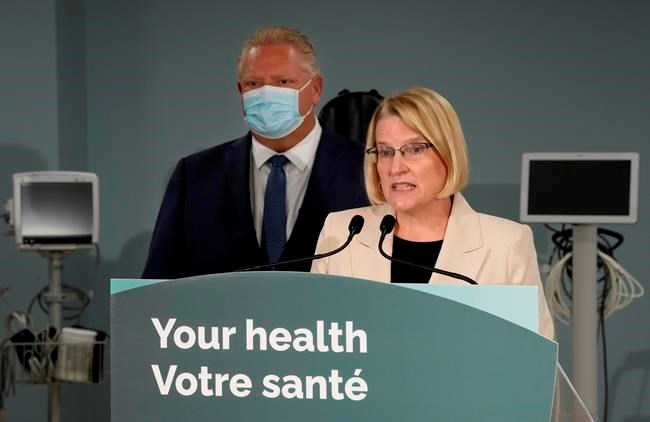Ontario is preparing for the next step in its expansion of private clinics that can offer publicly funded tests and procedures, a move that comes as hospitals sound an alarm about acute-care capacity.
The province's plan to expand the number of facilities offering services such as cataract surgeries and MRIs, as well as adding hip and knee-replacement surgeries, has raised the ire of some health advocates who worry it is a stepping stone to privatization.
Health Minister Sylvia Jones says the expansion will allow more procedures to be performed and reduce wait times, and patients will never have to pay out of pocket for OHIP-insured services.
Four more clinics are offering cataract surgeries since the initial January 2022 announcement, and Jones says starting this spring the province will seek applications for clinics to provide more services, including more MRIs, CT scans, GI endoscopies and orthopedic surgeries.
Jones's announcement came the same day the Ontario Hospital Association said the average length of stay in emergency departments for patients waiting to be admitted is the highest it has been in the last 12 months
"Unfortunately, this reflects a historic seasonal pattern of increased demand for care that is being exacerbated by inadequate capacity across the health-care system, and rampant respiratory illnesses circulating across Ontario during the winter months," president and CEO Anthony Dale wrote in a statement.
It is a long-term, systemic problem stemming from staffing constraints and high numbers of patients awaiting discharge to a different level of care, such as to a long-term care home, he wrote.
Jones said Wednesday, when asked about hospital pressures, that the province has made a number of investments to ensure hospitals have the resources they need.
"This is not a money investment, conversation or challenge," she said. "It is making sure that we have sufficient health human resources out in our communities to serve our communities. We have done that in the short, medium and long term."
Liberal health critic Adil Shamji said money is at issue, as record numbers of hospitals run deficits.
“The minister of health had the gall to state that solving the emergency room crisis is about ‘making sure we have sufficient health human resources,’" he wrote in a statement.
"How does the minister expect hospitals to retain health-care workers when they can barely stay afloat themselves?"
Jones also announced that Accreditation Canada has been selected to develop an enhanced oversight and quality assurance program for those clinics.
"We've been clear all along that any expansion to community surgical and diagnostic centres must be thoughtful, and these centres should be held to the same accountability and standards to provide the same level of care as our hospitals," she said.
There are currently more than 900 private health facilities in the province, largely providing diagnostic imaging services.
New Democrat Peter Tabuns said the Progressive Conservative government's plan could actually increase wait times.
"Our fundamental concern is that as you ... expand private clinics in this province, you'll be bleeding staff and money out of the public system and you will be putting people in a situation where wait times for publicly funded health care will become even longer," he said.
"As we have more and more private health-care facilities, the pressure on people to pay for unnecessary treatments, unnecessary equipment, to be upsold, is very strong."
This report by The Canadian Press was first published Jan. 17, 2024.
Allison Jones, The Canadian Press



